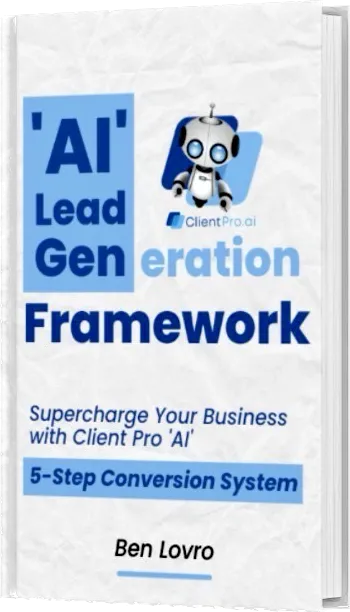Ben Lovro Blogs
AI' Client Conversion Framework

What Are Free Ways To Find Wholesale Real Estate Deals?
Introduction
Finding wholesale real estate deals can be a lucrative endeavor, but it often requires dedication, research, and creativity. Wholesaling is a real estate strategy where you find a property at a lower price and sell the contract to another buyer for a higher price without doing any renovations. Here are free or low-cost methods to find wholesale real estate deals:

Networking:
Building relationships with other real estate professionals is crucial. Attend local real estate investor meetings, join real estate investment groups on social media, and connect with real estate agents, contractors, and other wholesalers. The more people you know in the industry, the more likely you are to hear about potential deals.
Networking, in both professional and social contexts, entails establishing and nurturing relationships with individuals, groups, or entities to mutually share information and resources. It's a strategic tool leveraged by individuals and businesses alike to expand their knowledge, access opportunities, and foster collaborations. In today's digital age, networking has transcended beyond face-to-face interactions, increasingly thriving on online platforms, ensuring global connectivity and enhanced accessibility.
Driving for Dollars:
This strategy involves driving around neighborhoods to look for distressed prperties. Signs that a property may be a potential wholesale deal include overgrown lawns, boarded-up windows, or significant disrepair. Once you identify a property, you can use public records to find the owner and reach out to them directly.
"Driving for Dollars" is a proactive real estate investment strategy where investors drive around neighborhoods to identify undervalued or distressed properties. By spotting visual cues like worn-out exteriors or overgrown lawns, they aim to purchase these properties below market value. This hands-on approach offers investors a direct way to uncover potential deals, often before they're publicly listed, providing a competitive edge in the real estate market.
Direct Mail Campaigns:
Although sending mail isn't free, you can do this relatively cheaply. Target neighborhoods or properties that fit your criteria and send postcards or letters to the owners expressing your interest in purchasing their property. Be sure to follow up consistently.
Direct Mail Campaigns involve sending targeted promotional materials directly to potential customers or clients through postal mail. This classic marketing strategy offers a personal touch, allowing businesses to precisely target demographics based on data analysis. By combining compelling content with eye-catching designs, these campaigns can effectively drive engagement, generate leads, and yield a high return on investment, making them a valuable tool in a marketer's arsenal.
Online Resources:
Utilize free online platforms like Craigslist, Facebook Marketplace, and other local classified websites. Often, property owners list their properties on these sites to avoid paying realtor fees. Keep an eye out for properties that are for sale by owner (FSBO).
Online Resources play a pivotal role in modern-day information dissemination and decision-making. These digital tools, which include websites, e-books, databases, and more, provide users with instantaneous access to vast amounts of data and knowledge. Leveraging online resources ensures that individuals and businesses remain updated, can conduct comprehensive research efficiently, and engage in continuous learning, underscoring their significance in today's digitized era.
Public Records:
Visit your local county’s office or website to access public records. Look for properties with tax liens, properties in pre-foreclosure, or owners who live out of state. These can be indicators that the owner might be motivated to sell quickly.
Public Records refer to documents or pieces of information that are not considered confidential and are maintained by government agencies. These records are available for public viewing and offer a wealth of knowledge on various subjects, from property ownership to legal judgments.
Real Estate Websites:
Websites like Zillow, Redfin, and Realtor.com often have a section for foreclosed properties. While these are not exclusively wholesale deals, they can sometimes be purchased below market value.
Real Estate Websites are digital platforms dedicated to the buying, selling, and leasing of properties. These sites provide users with detailed listings, virtual tours, and comparative market analyses, streamlining the property search process. As technology advances, such websites have become indispensable tools for both real estate professionals and potential buyers, offering a convenient way to explore the real estate market from the comfort of one's home.
Real Estate Auctions:
Attend local real estate auctions. Properties at auctions are often distressed and can be acquired below market value. However, it's important to do your due diligence beforehand and understand the auction process.
Real Estate Auctions represent a unique avenue for property acquisition, where properties are sold to the highest bidder. Often utilized for selling distressed or foreclosed properties, these auctions can present lucrative opportunities for investors seeking below-market prices. However, they require thorough research and due diligence, as participants typically compete in a fast-paced environment, making informed decisions crucial for successful outcomes.
Bandit Signs:
Posting signs in your target neighborhoods that say “We Buy Houses” with your contact information can attract potential sellers. Ensure you're complying with local ordinances regarding signage.
Bandit Signs, often seen as roadside advertisements, are a grassroots marketing method employed primarily by real estate investors. Typically small and corrugated, these signs, bearing messages like "We Buy Houses," aim to directly target homeowners looking to sell quickly. While they can be effective in generating leads, it's essential to be aware of local regulations to avoid potential legal complications.
Local Real Estate Investor Associations (REIAs):
Joining REIAs can provide a wealth of information and contacts. These associations often have regular meetings and are a great place to network and learn about potential deals.
Local Real Estate Investor Associations (REIAs) are organized groups that provide a platform for real estate investors to network, learn, and collaborate. These associations offer members access to industry-related seminars, workshops, and resources. By fostering a community spirit, REIAs enable investors to share knowledge, discuss market trends, and potentially identify joint venture opportunities, thereby enhancing their investment strategies and prospects.
Wholesaler Websites:
There are websites dedicated to wholesale real estate listings. Some of these are free to browse and can be a good resource for finding potential deals.
Social Media:
Platforms like LinkedIn, Twitter, and Instagram can be powerful tools. Follow real estate-related accounts, engage with their content, and post about your own interest in finding wholesale deals. Sometimes deals come from the most unexpected connections.
Social media platforms have transformed the landscape of communication, enabling instant connectivity and interaction on a global scale. Serving as powerful tools for businesses, brands, and individuals, these platforms facilitate information sharing, brand promotion, and networking. By leveraging the vast reach of social media, users can cultivate relationships, engage with diverse audiences, and stay updated on trending topics, ensuring they remain relevant in a rapidly evolving digital age.
Local Government and Community Development Programs:
Sometimes local governments or community development programs have properties or land available for redevelopment. These can be excellent sources for wholesale deals.
Local government and community development programs play a crucial role in fostering urban growth and enhancing the quality of life for residents. By prioritizing infrastructural improvements, public services, and community engagement, these programs ensure sustainable and inclusive development. Their initiatives directly impact neighborhoods, often revitalizing them, while promoting socio-economic progress and fostering a sense of communal identity and pride among inhabitants.
Door Knocking:
This is a more direct approach but can be effective. If you find a property that looks distressed, knock on the door and speak with the owner. Always be respectful and understanding of their situation.
Door knocking, as a traditional and direct approach, remains a valuable method for professionals, particularly in real estate and sales. This hands-on strategy offers immediate feedback, fosters genuine connections, and provides insights into local sentiments. Though it requires tenacity and excellent interpersonal skills, the personal touch of face-to-face interaction often leads to meaningful and impactful business relationships.
Real Estate Forums and Online Communities:
Engage in real estate-focused forums and online communities. BiggerPockets, for example, is a popular real estate investing website where you can learn and connect with other investors.
Real estate forums and online communities have emerged as indispensable platforms for industry professionals and enthusiasts. These digital spaces facilitate the exchange of insights, experiences, and advice, bridging gaps between novices and veterans. With a plethora of perspectives and resources available, such forums foster informed decision-making and cultivate a collaborative spirit in the expansive world of real estate.
Expired Listings:
Sometimes properties that were listed on the MLS but didn't sell become good candidates for wholesaling. You can find expired listings through real estate agents or online tools.
Expired listings represent properties that were previously on the market but did not sell within the listing agreement's timeframe. For real estate agents and potential buyers, these listings can offer unique opportunities. Agents can approach sellers with strategies for a relist, while buyers might find sellers more motivated, potentially leading to favorable negotiations and transactions.
Cold Calling:
Using public records, you can compile a list of potential sellers and call them to inquire if they are interested in selling. Be prepared with a script and be respectful of their time and privacy.
Cold calling is a proactive strategy where businesses or individuals reach out to potential clients or customers who have not expressed prior interest in their services or products. While often associated with sales and telemarketing, its intent is to introduce offerings and build relationships. The technique requires thorough preparation and effective communication skills to yield positive results.
Local Newspapers:
Sometimes property owners advertise in local newspapers, especially in smaller towns. Regularly check the classified section for potential deals.
Local newspapers serve as a vital conduit of information, catering specifically to the interests and concerns of a community. These publications not only provide updates on regional events, news, and developments but also offer a platform for local businesses to advertise their services. Readers rely on them for a connection to their community's pulse, history, and local narratives.
Word of Mouth:
Let your friends, family, and acquaintances know that you’re looking for wholesale real estate deals. Sometimes personal connections can lead to the best opportunities.
Word of mouth remains one of the most potent forms of marketing, transcending technological advancements in communication. It is built on trust and personal recommendations. When individuals share positive experiences or give endorsements, it carries a genuine weight of authenticity. This method of organic information dissemination can influence decisions and foster loyalty more effectively than many traditional advertising channels.
Real Estate Meetups and Events:
Attending local real estate meetups and events can provide networking opportunities and potential leads on wholesale deals.
Real Estate Meetups and Events serve as invaluable platforms for professionals and enthusiasts alike to network, learn, and collaborate. Attendees gain insights into market trends, investment strategies, and emerging opportunities. Such gatherings foster community ties, enhance knowledge, and facilitate partnerships, proving instrumental in keeping individuals updated and connected in the ever-evolving real estate landscape.
Partnerships:
Consider partnering with someone who has experience in real estate wholesaling. They might have leads on deals and can provide valuable insight and guidance.
Partnerships represent a strategic alliance where two or more entities collaborate to achieve common goals. By pooling resources, expertise, and strengths, partners can effectively address market challenges, enhance operational efficiency, and drive growth. Such collaborations promote innovation, risk-sharing, and capital generation, underscoring the importance of aligned objectives and clear communication for long-term success.
Remember, the key to successful wholesaling is persistence and consistency. It's important to be proactive and dedicated in your search for deals. Also, always ensure that you’re operating within the legal framework of your area, as laws and regulations regarding real estate wholesaling can vary.
In conclusion, finding wholesale real estate deals doesn't always require significant financial investment. With the right strategies and a little creativity, you can uncover opportunities in the market without breaking the bank. The above methods, when employed diligently and ethically, can lead to fruitful results in your wholesaling ventures.
Contact Us

Bet On Yourself
Empowering entrepreneurs and real estate investors with the tools they need to scale.
ben@clientpro.ai
(803) 921-9915
100 Old Cherokee Road ste f 342





